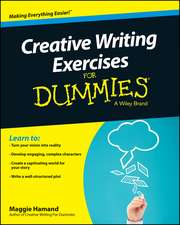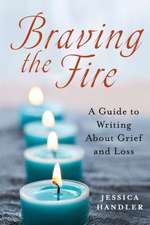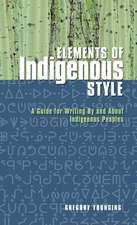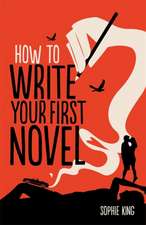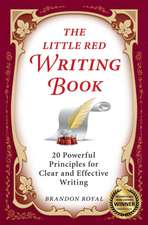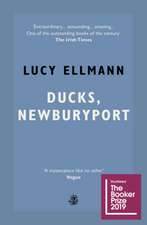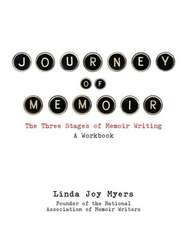Telling True Stories: A Nonfiction Writers' Guide from the Nieman Foundation at Harvard University
Editat de Mark Kramer, Wendy Callen Limba Engleză Paperback – 31 ian 2007 – vârsta de la 18 ani
Inspiring stories and practical advice from America’s most respected journalists The country’s most prominent journalists and nonfiction authors gather each year at Harvard’s Nieman Conference on Narrative Journalism. Telling True Stories presents their best advice—covering everything from finding a good topic, to structuring narrative stories, to writing and selling your first book. More than fifty well-known writers offer their most powerful tips, including:
• Tom Wolfe on the emotional core of the story
• Gay Talese on writing about private lives
• Malcolm Gladwell on the limits of profiles
• Nora Ephron on narrative writing and screenwriters
• Alma Guillermoprieto on telling the story and telling the truth
• Dozens of Pulitzer Prize–winning journalists from the Atlantic Monthly, New Yorker, New York Times, Los Angeles Times, Washington Post and more . . .
The essays contain important counsel for new and career journalists, as well as for freelance writers, radio producers, and memoirists. Packed with refreshingly candid and insightful recommendations, Telling True Stories will show anyone fascinated by the art of writing nonfiction how to bring people, scenes, and ideas to life on the page.
• Tom Wolfe on the emotional core of the story
• Gay Talese on writing about private lives
• Malcolm Gladwell on the limits of profiles
• Nora Ephron on narrative writing and screenwriters
• Alma Guillermoprieto on telling the story and telling the truth
• Dozens of Pulitzer Prize–winning journalists from the Atlantic Monthly, New Yorker, New York Times, Los Angeles Times, Washington Post and more . . .
The essays contain important counsel for new and career journalists, as well as for freelance writers, radio producers, and memoirists. Packed with refreshingly candid and insightful recommendations, Telling True Stories will show anyone fascinated by the art of writing nonfiction how to bring people, scenes, and ideas to life on the page.
Preț: 107.87 lei
Nou
Puncte Express: 162
Preț estimativ în valută:
20.64€ • 21.29$ • 17.22£
20.64€ • 21.29$ • 17.22£
Carte disponibilă
Livrare economică 06-20 martie
Livrare express 19-25 februarie pentru 28.16 lei
Preluare comenzi: 021 569.72.76
Specificații
ISBN-13: 9780452287556
ISBN-10: 0452287553
Pagini: 317
Dimensiuni: 136 x 203 x 19 mm
Greutate: 0.29 kg
Editura: Plume Books
ISBN-10: 0452287553
Pagini: 317
Dimensiuni: 136 x 203 x 19 mm
Greutate: 0.29 kg
Editura: Plume Books
Recenzii de la cititorii Books Express
Anonim a dat nota:
O carte foarte buna pentru storytelleri, oameni care lucreaza in comunicare, dar si cei care se pregatesc sa urmeze un curs de creative writing. Recomand!
Cuprins
Telling True Stories
Acknowledgments
Preface
Part I: An Invitation to Narrative
Stories Matter by Jacqui Banaszynski
Delving into Private Lives by Gay Talese
The Narrative Idea by David Halberstam
Difficult Journalism That's Slap-Up Fun by Katherine Boo
Part II: Finding, Researching, and Reporting Topics
Introduction by Mark Kramer and Wendy Call
Finding Good Topics: A Writer's Questions by Lane DeGregory
Finding Good Topics: An Editor's Questions by Jan Winburn
Reporting for Narrative: Ten Overlapping Rules by Mark Kramer
To Tape or Not to Tape? by Adam Hochschild, Jacqui Banaszynski, Jon Franklin, and Gay Talese
Interviewing: Accelerated Intimacy by Isabel Wilkerson
The Psychological Interview by Jon Franklin
Participatory Reporting: Sending Myself to Prison by Ted Conover
Being There by Anne Hull
Not Always Being There by Louise Kiernan
Reporting Across Cultures by Victor Merina
Reporting on Your Own by S. Mitra Kalita
Field Notes to Full Draft by Tracy Kidder
Doing Enough Reporting? by Walt Harrington
From Story Idea to Published Story by Cynthia Gorney
(Narrative) J School for People Who Never Went by Adrian Nicole LeBlanc
Part III: Name Your Subgenre
Introduction by Mark Kramer and Wendy Call
Profiles by Jacqui Banaszynski
The Ladder of Abstraction by Roy Peter Clark
Every Profile Is an Epic Story by Tomas Alex Tizon
The Limits of Profiles by Malcolm Gladwell
Travel Writing: Inner and Outer Journeys by Adam Hochschild
The Personal Essay and the First-Person Character by Phillip Lopate
First Personal Singular: Sometimes, It Is About You by DeNeen L. Brown
Columns: Intimate Public Conversations by Donna Britt
Writing About History by Jill Lepore
Adventures in History by Melissa Fay Greene
Narrative Investigative Writing by Katherine Boo
Public Radio: Community Storytelling by Jay Allison
Part IV: Constructing a Structure
Introduction by Mark Kramer and Wendy Call
What Narrative Writers Can Learn from Screenwriters by Nora Ephron
To Begin the Beginning by DeNeen L. Brown
Narrative Distance by Jack Hart
Hearing Our Subjects' Voices: Quotes and Dialogue by Kelley Benham
Hearing Our Subjects' Voices: Keeping It Real and True by Debra Dickerson
Weaving Story and Idea by Nicholas Lemann
Endings by Bruce DeSilva
Part V: Building Quality into the Work
Introduction by Mark Kramer and Wendy Call
Character by Jon Franklin
Details Matter by Walt Harrington
Developing Character by Stanley Nelson
Reconstructing Scenes by Adam Hochschild
A Reconstructed Scene by Adam Hochschild
Setting the Scene by Mark Kramer
Handling Time by Bruce DeSilva
Sequencing: Text as Line by Tom French
Writing Complicated Stories by Louise Kiernan
How I Get to the Point by Walt Harrington
The Emotional Core of the Story by Tom Wolfe
Telling the Story, Telling the Truth by Alma Guillermoprieto
On Voice by Susan Orlean
Part VI: Ethics
Introduction by Mark Kramer and Wendy Call
The Line Between Fact and Fiction by Roy Peter Clark
Toward an Ethical Code for Narrative Journalists by Walt Harrington
Playing Fair with Subjects by Isabel Wilkerson
Securing Consent by Tracy Kidder
Truth and Consequences by Katherine Boo
Dealing with Danger: Protecting Your Subject and Your Story by Sonia Nazario
A Dilemma of Immersion Journalism by Anne Hull
Ethics in Personal Writing by Debra Dickerson
Taking Liberties: The Ethics of the Truth by Loung Ung
The Ethics of Attribution by Roy Peter Clark
What About Endnotes? by Sonia Nazario and Nicholas Lemann
Part VII: Editing
Introduction by Mark Kramer and Wendy Call
On Style by Emily Hiestand
A Writer and Editor Talk Shop by Jan Winburn and Lisa Pollak
Revising--Over and Over Again by Anne Hull
Transforming One Hundred Notebooks into Thirty-five Thousand Words by Sonia Nazario
How to Come Up Short by Tom Hallman
Narrative in Four Boxes by Jacqui Banaszynski
Serial Narratives by Tom French
Care and Feeding of Editors and Writers by Jacqui Banaszynski
Part VIII: Narrative in the News Organization
Introduction by Mark Kramer and Wendy Call
Beginning in Narrative by Walt Harrington
A Brief History of Narrative in Newspaper by Jack Hart
Nurturing Narrative in the Newsroom by Jack Hart
A Storyteller's Lexicon by Jack Hart
Narrative as a Daily Habit by Lane DeGregory
Building a Narrative Team by Maria Carrillo
Two Visions, One Series: A Writer and an Editor Talk About What They Do by Jacqui Banaszynski and Tomas Alex Tizon
Team Storytelling by Louise Kiernan
Photographer as Narrative Storyteller by Molly Bingham
Subversive Storytellers: Starting a Narrative Group by Bob Batz Jr.
Part IX: Building a Career in Magazines and Books
Introduction by Mark Kramer and Wendy Call
Making It as a Freelancer by Jim Collins
Not Stopping: Time Management for Writers by Stewart O'Nan
Lessons from the Jury Box by Jack Hart
Working with an Agent by Melissa Fay Greene
What Makes a Good Book? by Helene Atwan
From Book Idea to Book Contract by Jim Collins
Your Book and the Marketplace by Geri Thoma
Crossing Over: From Advocacy to Narrative by Samantha Power
A Passion for Writing by Susan Orlean
Suggested Reading
Web Sites and Internet Resources
About the Editors
About the Contributors
Index
Acknowledgments
Preface
Part I: An Invitation to Narrative
Stories Matter by Jacqui Banaszynski
Delving into Private Lives by Gay Talese
The Narrative Idea by David Halberstam
Difficult Journalism That's Slap-Up Fun by Katherine Boo
Part II: Finding, Researching, and Reporting Topics
Introduction by Mark Kramer and Wendy Call
Finding Good Topics: A Writer's Questions by Lane DeGregory
Finding Good Topics: An Editor's Questions by Jan Winburn
Reporting for Narrative: Ten Overlapping Rules by Mark Kramer
To Tape or Not to Tape? by Adam Hochschild, Jacqui Banaszynski, Jon Franklin, and Gay Talese
Interviewing: Accelerated Intimacy by Isabel Wilkerson
The Psychological Interview by Jon Franklin
Participatory Reporting: Sending Myself to Prison by Ted Conover
Being There by Anne Hull
Not Always Being There by Louise Kiernan
Reporting Across Cultures by Victor Merina
Reporting on Your Own by S. Mitra Kalita
Field Notes to Full Draft by Tracy Kidder
Doing Enough Reporting? by Walt Harrington
From Story Idea to Published Story by Cynthia Gorney
(Narrative) J School for People Who Never Went by Adrian Nicole LeBlanc
Part III: Name Your Subgenre
Introduction by Mark Kramer and Wendy Call
Profiles by Jacqui Banaszynski
The Ladder of Abstraction by Roy Peter Clark
Every Profile Is an Epic Story by Tomas Alex Tizon
The Limits of Profiles by Malcolm Gladwell
Travel Writing: Inner and Outer Journeys by Adam Hochschild
The Personal Essay and the First-Person Character by Phillip Lopate
First Personal Singular: Sometimes, It Is About You by DeNeen L. Brown
Columns: Intimate Public Conversations by Donna Britt
Writing About History by Jill Lepore
Adventures in History by Melissa Fay Greene
Narrative Investigative Writing by Katherine Boo
Public Radio: Community Storytelling by Jay Allison
Part IV: Constructing a Structure
Introduction by Mark Kramer and Wendy Call
What Narrative Writers Can Learn from Screenwriters by Nora Ephron
To Begin the Beginning by DeNeen L. Brown
Narrative Distance by Jack Hart
Hearing Our Subjects' Voices: Quotes and Dialogue by Kelley Benham
Hearing Our Subjects' Voices: Keeping It Real and True by Debra Dickerson
Weaving Story and Idea by Nicholas Lemann
Endings by Bruce DeSilva
Part V: Building Quality into the Work
Introduction by Mark Kramer and Wendy Call
Character by Jon Franklin
Details Matter by Walt Harrington
Developing Character by Stanley Nelson
Reconstructing Scenes by Adam Hochschild
A Reconstructed Scene by Adam Hochschild
Setting the Scene by Mark Kramer
Handling Time by Bruce DeSilva
Sequencing: Text as Line by Tom French
Writing Complicated Stories by Louise Kiernan
How I Get to the Point by Walt Harrington
The Emotional Core of the Story by Tom Wolfe
Telling the Story, Telling the Truth by Alma Guillermoprieto
On Voice by Susan Orlean
Part VI: Ethics
Introduction by Mark Kramer and Wendy Call
The Line Between Fact and Fiction by Roy Peter Clark
Toward an Ethical Code for Narrative Journalists by Walt Harrington
Playing Fair with Subjects by Isabel Wilkerson
Securing Consent by Tracy Kidder
Truth and Consequences by Katherine Boo
Dealing with Danger: Protecting Your Subject and Your Story by Sonia Nazario
A Dilemma of Immersion Journalism by Anne Hull
Ethics in Personal Writing by Debra Dickerson
Taking Liberties: The Ethics of the Truth by Loung Ung
The Ethics of Attribution by Roy Peter Clark
What About Endnotes? by Sonia Nazario and Nicholas Lemann
Part VII: Editing
Introduction by Mark Kramer and Wendy Call
On Style by Emily Hiestand
A Writer and Editor Talk Shop by Jan Winburn and Lisa Pollak
Revising--Over and Over Again by Anne Hull
Transforming One Hundred Notebooks into Thirty-five Thousand Words by Sonia Nazario
How to Come Up Short by Tom Hallman
Narrative in Four Boxes by Jacqui Banaszynski
Serial Narratives by Tom French
Care and Feeding of Editors and Writers by Jacqui Banaszynski
Part VIII: Narrative in the News Organization
Introduction by Mark Kramer and Wendy Call
Beginning in Narrative by Walt Harrington
A Brief History of Narrative in Newspaper by Jack Hart
Nurturing Narrative in the Newsroom by Jack Hart
A Storyteller's Lexicon by Jack Hart
Narrative as a Daily Habit by Lane DeGregory
Building a Narrative Team by Maria Carrillo
Two Visions, One Series: A Writer and an Editor Talk About What They Do by Jacqui Banaszynski and Tomas Alex Tizon
Team Storytelling by Louise Kiernan
Photographer as Narrative Storyteller by Molly Bingham
Subversive Storytellers: Starting a Narrative Group by Bob Batz Jr.
Part IX: Building a Career in Magazines and Books
Introduction by Mark Kramer and Wendy Call
Making It as a Freelancer by Jim Collins
Not Stopping: Time Management for Writers by Stewart O'Nan
Lessons from the Jury Box by Jack Hart
Working with an Agent by Melissa Fay Greene
What Makes a Good Book? by Helene Atwan
From Book Idea to Book Contract by Jim Collins
Your Book and the Marketplace by Geri Thoma
Crossing Over: From Advocacy to Narrative by Samantha Power
A Passion for Writing by Susan Orlean
Suggested Reading
Web Sites and Internet Resources
About the Editors
About the Contributors
Index





